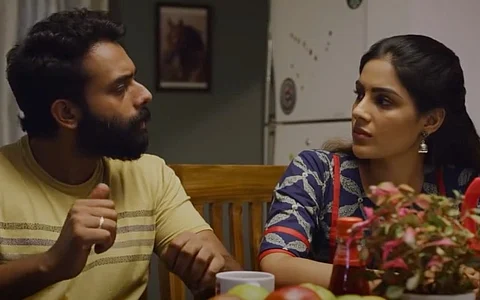
- In-Depth Stories
- Web Stories
- Reviews
- News
- FC Lists
- Interviews
- Features
- FC SpecialsFC Specials

Director: Shaji Azeem
Cast: Arjun Ashokan, Samyukta Menon, Irshad.
Shaji Azeez's first film Wolf, based on writer GR Indugopan's short story Chennaya, starts off promisingly. Sanjay (Arjun Ashokan) takes a detour on his way home to visit his fiancé Asha (Samyukta Menon) a couple of weeks before they are due to get married. But when he gets there, she's not pleasantly surprised nor is she excited to see him. There's an obvious indifference in her attitude and she wants him to get out of there as soon as he can. The awkwardness is hilarious and you almost feel bad for the guy. They're just days away from getting married but their 'chemistry' is that of total strangers being forced to speak to each other.
But it's not just their relationship status that's forcing them to finally open up. Apart from being locked into an engagement, they're also locked up in this house. It's the night before PM Modi's first nationwide lockdown and there are police officers right outside the house to enforce it. Her mother is away too and the situation demands that this couple spend the night under the same roof in what's a dress rehearsal for the future.
Her displeasure is a result of a variety of Sanjay's character traits. On his way there, you get glimpses of his temper and the male ego that amplifies it. His friends, too, are complicit in accommodating his anger, as though it's his personality or quirk. But Asha is repulsed by it. "Do not call me edi or nee," she says sternly, to her future husband. She also asks him why he has never given her the chance to open up to him. "Do you think talking rudely makes you more of a man?," she asks, revealing more about Sanjay than the previous half hour of the film.
But you soon start seeing why his tone is more than just a personality trait. As their conversation reaches a point where they're finally revealing themselves to each other, you understand how deeply misogyny is ingrained in someone 'normal' like Sanjay. When he opens up about reasons why he can never marry his best friend Riva, he states what he thinks is an acceptable excuse. "I cannot marry someone who wears shorts," he says, nonchalantly. Stuck in a different era, this line also reveals that he's created a 'marriage type' while also hinting that this type should only wear what her husband approves of.
In these scenes, the dialogues are powerful and in Asha, we see a confident woman who will not be burdened by the whims of a man-child. But Sanjay isn't merely an archetype either. You sense his willingness to change or at least an effort to try. During these discussions, you get the idea that it is perhaps the first time he's coming across concepts like equality and mutual respect in the context of relationships. While it's obvious that they're a mismatch, you also understand why this discussion needs to happen. Even Asha seems relieved at the changes the discussion is bringing in Sanjay, even though he's still got a long way to go.
But the film never settles for this pitch. It wants to be more than a discussion and wants this conflict to be placed on a more primal setting. Instead of seeing people simply as people, the film now wants to place this couple in the scope of nature itself, with the theory of natural selection being referred to in detail. For this, the film uses the help of a third character even though his introduction is not milked for shock value.
His presence early on develops into a stretch of excellent dark humour where you see the frailties of someone like Sanjay. The presence of a 'man' exposes the nativities of a boy who has never ventured out of the comforts of his closed, narrow universe. So when Sanjay begins to play protector, this 'intruder' hits him with science and nature, appearing progressive at first and then creepy later on. But his shift in behaviour is not backed by the writing. It's as though it is time for the screenplay to shift gears into the third act and the intensity is ramped up inorganically.
While these dialogues remain fascinating from a distance, like listening to the escapades of a traveller, a fatigue sets in quickly. This dialogue is between two adult men and the topic deals with the inherent nature of women. While appearing progressive at first, this discussion moves into familiar territory all too quickly, especially when Asha leaves the room. From a participant, Asha too recedes to spectator mode as we pull up front row seats to a mansplaining lecture about the inner workings of a woman's mind. It's a one man show really and the film takes a detour for the worse when it appears to reinforce everything Sanjay appears to be right at the beginning.
The politics of the films seems to tie itself into knots and we never really stay with the characters during their transitions. And by the end, what the film does is make you feel sorry for Asha. She appears independent but not enough to breakaway without the protection of a man. Like in Kappela, this film too paints the heroine as someone naive and innocent, incapable of distinguishing between good and bad. For all the great performances and the making, Wolf needed a stronger point to put across than what it finally does. But it eventually ends up like a wolf in sheep's clothing, representing problematic politics in the garb of discussion.